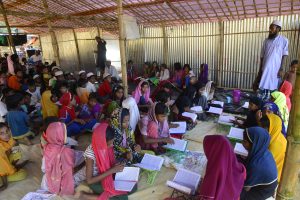In August 2017, the Myanmar military launched a genocidal campaign against the Rohingya community, triggering a severe humanitarian crisis. I was one of those who fled, making an 11-day journey by foot from northern Rakhine State in Myanmar, where my family and I were from, to the Cox’s Bazar refugee camps in southeastern Bangladesh. I joined over 1 million Rohingya in Bangladesh who have been displaced through successive waves of Myanmar military-led attacks and persecution. At the age of 14, I fled my home, terminated my education, and began a new life in a different country.
It has been six years since the genocide that led to an exodus of the Rohingya to Bangladesh. Despite efforts to provide Rohingya refugees access to life-saving services and shelter in Bangladesh, the government has made little progress in resolving refugees’ access to basic rights, including education.
One of the most severe restrictions refugees face in the camps is access to formal education. Since the beginning of the crisis, the government has resisted attempts at the long-term integration of Rohingya into Bangladeshi society. It has forbidden them to work, refused to grant them legal status as refugees, and refused them access to formal education.
These six years without books and education have created a lost generation of Rohingya youth. For one, the lack of access to education has led to an increase in Rohingya youth migrating out of Bangladesh, taking dangerous sea routes to Malaysia, Indonesia, and other neighboring countries in search of a safer and better life. Rohingya girls are also led into forced marriages at an early age. With little to no education and few opportunities for economic empowerment, many lack the financial independence to gain autonomy over their lives, increasing their risks of experiencing domestic violence and abuse. I have seen this firsthand when some of those closest to me were married young.
Humanitarian organizations in the camps are allowed to run temporary learning centers, known as “child-friendly spaces,” which accept only young children. These children receive an informal education – the curriculum is neither certified nor recognized by any country – and they are barred from education in the Bengali language despite living in Bangladesh. In recent years the government has started to allow a small pilot education program featuring the Myanmar curriculum to be run in the camps, but this program is not widespread.
As the government of Bangladesh only permits access to basic informal education, Rohingya youth who require secondary-level education have even fewer opportunities. Restrictions on movement outside the camps prevent Rohingya refugees from working or accessing formal education. I was not able to access any education in the camps. Nonetheless, I taught myself by watching YouTube videos and treating the internet as my school.
Fortunately, I received training from some humanitarian organizations in the camps about women’s health and safety. Subsequently, I passed on some of this knowledge, whenever possible, to other refugee women and girls. Because of threats in Bangladesh for my work as a human rights defender and woman advocating for education, I was resettled to the United States along with other Rohingya families from the Bangladesh refugee camps in late 2022. Unlike many of my friends who have remained in Bangladesh, I can now pursue higher education in the United States.
It is essential to recognize the resilience of the Rohingya people in finding solutions for our community. With severe restrictions on education for Rohingya children and youth, many community-led initiatives have sprung up to fill in the gap. Private community-led schools being taught in people’s own shelters have been set up. These community schools run classes from pre-kindergarten up to the 12th grade.
These schools teach subjects ranging from Burmese, mathematics, and the English language. These schools also give children a chance to sit for a final examination at the end of a course. Importantly, these community-run schools give students a chance to pick up English language abilities. Instead of meaningfully supporting the community-run schools, in December 2021, the Bangladeshi government ordered the closure of these community-run schools, severely restricting access for Rohingya youth to obtain an education.
Some community-run schools continue to operate secretly. These classes are essential. However, their Rohingya teachers require payment. On average, students are required to pay between 500 and 1,000 Bangladeshi taka per month. Not all families can afford this cost. Recently, this has become even more unfeasible after the World Food Program cut food rations. Families use their own money to pay for the classes but also now for more food items.
There are other online alternatives. Although online courses exist, access is restricted – and the internet is not readily available in the camps. Few students can afford to buy a smartphone, internet data, or a computer.
The past six years without adequate education resources have negatively impacted my community. However, Rohingya youth like myself are creating solutions for themselves, but the international community must support us. On a recent trip to Washington, D.C., I repeatedly brought up the key challenges our community has faced inside and outside of Bangladesh with U.S. government officials.
To change this moving forward, donor governments, including the United States and international organizations, should fund Rohingya-led education programs in the camps. These programs could involve community-run schools, libraries, and leadership and other capacity-building trainings. These programs should be led by Rohingya teachers who are the most trusted and experienced to teach our youth.
Finally, the Bangladesh government must end its restrictions on Rohingya-led schools and allow formal education in the camps.
































